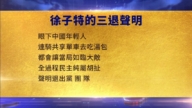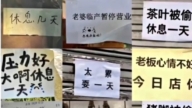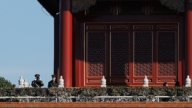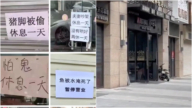【新唐人2012年12月20日讯】日前,中共在海外成立的“孔子学院”召开会议。大陆媒体报导说,“孔子学院”遭遇所谓“成长的烦恼”,全球“孔子学院掌门人”齐聚大会,商讨面临的难题。一度在全球迅速扩张版图的“孔子学院”,遭遇了什么“烦恼”呢﹖
18号,第七届“孔子学院”大会在北京国家会议中心落幕。代表们围绕如何融入当地社会与文化,如何破解专职教席之缺,如何实现可持续发展等议题展开了讨论。
中共喉舌报导说,“孔子学院”一直采用轮换制的任教方式,师资力量主要靠短期的派遣教师和志愿者支撑。专职教席的匮乏,越来越成为孔子学院在海外发展的瓶颈。
另外,一些孔子学院代表坦言,“孔子学院”在海外的推广中,并不是一帆风顺。个别西方国家将“孔子学院”视为政治的附庸,限制在当地的发展。
据了解,“孔子学院”是由“中国汉办”监督,表面上不是政府机构,但实际上是由中国教育部控制,由政府直接支持。海外《经济学人》杂志曾引用一位高官的话说,“孔子学院”是中共重要的海外宣传机构。
山东大学退休教授孙文广表示,一个国家如果有优秀的传统文化,国外人士会积极来吸取。如果利用政府的力量,大力去推广,往往带有政治色彩。
山东大学退休教授 孙文广:“它用成立这些孔子学院,还有推广孔子,实际上它是想给自己共产思潮做装饰。现在它用孔子学院来起到虚假的装饰作用,所以不被外国所欢迎。另外师资也很缺乏,真正有研究,学术上有水平的那些教师,不愿意去找这个学院任教。”
广西自由作家荆楚表示,西方国家是以基督文明作为主流意识形态,虽然孔子有那么大的影响力和号召力,但是,当中共用政府的权力去推广,这个东西就一定是自消货。
广西自由作家荆楚:“以基督文明做为主流意识形态的社会,排斥孔子学院是顺理成章的。它就是有一个显着的特点,它就是维护专制统治,(孔子学院)有很大的欺骗作用。”
自2004年全球第一所海外“孔子学院”在韩国正式挂牌,8年来,有400所孔子学院和500多个孔子课堂相继成立。有人做过统计,平均不到3天就开办一个以“孔子”命名的学院或课堂。
“孔子学院”一年要耗费中国人多少血汗钱?据汉办2011年度报告及官网消息,自2004年以来,汉办在全球建立“孔子学院”耗资5亿美元。中共主管宣传的政治局常委李长春,2009年对外说在世界各地建立“孔子学院”是“中国对外宣格局的重要组成部分”。
荆楚:“在海外每开办一个孔子学院,中国政府就给它几百万美元,就这样子搞,就想把中国(共)文化影响到世界,是共产党大文宣计划的一个步骤。这个过程本身就是一个腐败的过程,使那些国际投机分子就应合中国政府,从中国政府手上骗到纳税人的血汗。”
早在今年5月,博客蔡慎坤,在他的博文“谁在为孔子学院潇洒埋单?”中提及:业内人士透露,在运营上,每一所孔子学院的共同点都是亏损,巨额亏损。亏损的原因是多方面的,最重要的原因是运作模式与财务状况不透明。也因此,孔子学院一方面成了中国政府填不满的窟窿,一方面又成了教育部官员任意提取各国货币的取款机。
荆楚指出,中国国内有那么多简陋的校舍,有那么多上不去的孩子,中共却向国际上大把大把的挥霍。他认为,中共为了虚伪的面子,不顾国内人民的死活,中共政府丧尽天良。
采访编辑/唐睿 后制/黎安安
Growing Pains for CCP Regime-Funded Confucius Institutes
Recently, Confucius Institutes that have been
established overseas held a national convention.
The Confucius Institute global project is funded
by the Chinese Communist Party (CCP).
China’s media alleged that the Confucius Institute
project has now encountered growing pains.
The head of each Confucius Institute
discussed possible solutions.
What problems is the Confucius Institute facing,
after it has undergone a rapid global expansion?
On December 18, the 7th national convention
of overseas Confucius Institutes ended in Beijing.
The deputies discussed issues on how to achieve local
integration, how to cope with lack of full-time teachers,
and how to achieve sustainable development.
CCP official newspapers said that over years, the
Confucius Institutes have implemented a rotation policy.
This is achieved by dispatching
short-term teachers and volunteers.
The lack of full-time teachers has become a bottleneck
in the development of the Confucius Institute overseas.
Reportedly, some Confucius Institute deputies
admitted that overseas promotion was difficult.
Several Western countries view the Confucius
Institute as a politicized mission of the CCP.
They thus limit its expansion locally, said the news report.
Public data show that the Confucius Institute
is under the administration of Hanban.
This is an organ affiliated with the CCP Ministry of Education.
Li Changchun, the 5th-highest-ranking member of the
Politburo Standing Committee, was quoted in The Economist.
Li stated that the Confucius Institutes were “an important
part of China’s overseas propaganda set-up"
Sun Wenguang, retired professor at Shandong
University, comments on the issue.
A country’s excellent traditional culture will naturally
attract people around the world to go to study it.
But not if a regime vigorously promotes it, and
if it often smacks of political overtones, he says.
Sun Wenguang: “By setting up and promoting
the Confucius Institutes, the regime intends
to cover up its spreading of communism thought.
That’s why Confucius Institutes aren’t welcomed overseas.
A shortage of teachers indicates that the Institutes cannot
attract those teachers with real academic competence."
Jing Chu, freelancer in Guangxi, says that the
Western communities are based on Christian beliefs.
Confucius has been a powerful influence worldwide,
but the CCP regime’s official promotion only indicates
its products must be poor selling.
Jing Chu: “It’s natural that Confucius Institutes
are excluded in a society based on Christianity.
The CCP Confucius Institute project features
safeguarding of authoritarian rule.
And those Confucius Institutes also spread the party culture
to abroad through their education system. It is very deceptive."
The first overseas Confucius Institute
opened in South Korea in 2004.
Since then, 400 Confucius Institutes and over 500
Confucius courses have been set up overseas.
Data show that averagely, in less than three days, an institute
or course would be set up in the name of “the Confucius".
How much money has gone into
the existing Confucius Institutes?
According to Hanban’s 2011 annual report and its official
website information, since 2004, an injection of 500 million
dollars from the CCP regime has been used to set up the
Confucius Institutes worldwide.
In 2009, Li Changchun, one of the former CCP
top leaders, and in charge of propaganda, said that
the Confucius Institute global project is “an important
part of China’s overseas propaganda setup."
Jing Chu: “Each Confucius Institute receives
multimillion dollar injections from CCP regime.
This is a part of the regime’s overseas propaganda
plan to spread CCP’s own culture.
Establishing Confucius Institutes just
creates chances to commit corruption.
Those Western speculators can be offered
money by collaborating with the CCP regime."
In this May, scholar Cai Shenkun commented in his blog.
He asked, “Who is paying for the Confucius Institutes?"
The article said,"Insiders reveal that huge loss is a
common feature of all Confucius Institutes overseas.
These losses have many causes, with the most prevalent
being lack of transparent operations and financial conditions.
Thus, on one hand, the Confucius Institute
project has become a bottomless pit.
On the other, it has turned into an ATM for officials of the
Education Ministry to wantonly withdraw foreign currencies.”
Jing Chu indicates that shabby makeshift school
buildings are commonly found across China.
So many children cannot afford education.
The CCP has squandered in the world to create a disguise
for its rule, while disregarding the Chinese people.
Jing Chu remarks that the CCP regime is utterly immoral.




























